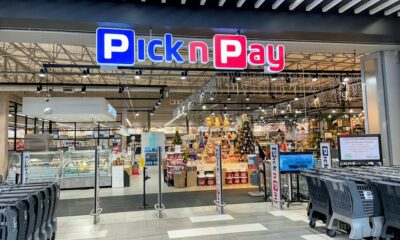Business
How Shein and Temu Quietly Stole a Chunk of SA Retail And What It Means for Local Brands

The Quiet Takeover No One Saw Coming
South African fashion retailers aren’t just fighting competitors in malls or online, they’re taking hits from phone screens, customs depots, and global supply chains. The arrival of Chinese giants Shein and Temu has reshaped the local retail landscape faster than many CEOs or regulators anticipated.
The numbers tell a blunt story: since 2020, these two platforms have soaked up roughly R7.3 billion in local sales, according to a 2024 report commissioned by the Localisation Support Fund. That’s not small change, it’s nearly 4% of the entire clothing retail market, and a staggering 37% of all fashion e-commerce sales in South Africa.
And the blowback is real: an estimated R960 million in lost local manufacturing value and 8,000 jobs erased or never created.
JSE Fashion Stocks Feeling the Pain
If you’ve followed the Johannesburg Stock Exchange this year, you’ve seen the slump:
-
Truworths down 46%
-
TFG down 31%
-
Mr Price down 25%
-
Pepkor down 10%
-
Woolworths doing slightly better, but still down 15%
Traditional retailers weren’t blindsided by online shopping, but they didn’t expect cross-border e-commerce platforms shipping directly to consumers at prices locals can’t match.
Their Market Share Rivals Big Brands, Without Physical Stores
Despite operating without the physical presence of brands like H&M, Cotton On, or Zara, Shein and Temu now hold a combined 3.6% share of the apparel market, more than those three international retailers combined (3.4%).
Shein arrived in 2020, Temu only in 2024. They don’t pay local mall rents, don’t run local factories, and rely heavily on TikTok, influencers, and mobile-first marketing to reach South Africans, especially young, trend-hungry shoppers priced out of brick-and-mortar fashion.
New Data Shows Just How Wide Their Reach Is
Two major studies reveal how embedded these platforms already are:
World Wide Worx (WWW) Findings
-
Half of South Africans never buy from Shein or Temu
-
Only 14% shop monthly on these platforms
-
Slow delivery and customs fees are major complaints
-
Their share of online usage: 15.3% last year
-
They trail behind Takealot (32%), but sit ahead of Amazon and Superbalist (12%+)
Arthur Goldstuck of WWW says the playing field is shifting. Tax loopholes have closed, customs rules tightened, and local retailers have stopped pretending the threat is temporary.
Growth, he predicts, will slow, not stop.
Reveal Insights: The “Real Numbers”?
Reveal tracks actual purchases, not survey opinions. Their 2024/25 data suggests Shein and Temu have a much larger footprint among economically active shoppers:
-
Temu: 16.6% (up from 10.7% last year)
-
Shein: 12.3% (up from 15.1% last year)
-
Takealot: 24%
-
TFG’s Bash: 12%
Here’s the kicker: their customer base is now comparable to Checkers Sixty60, South Africa’s number one e-commerce app in FMCG.
Sixty60 currently sits at 16.3%.
The Price Trap: High Users, Small Baskets
One caveat? Market share by customer numbers doesn’t equal revenue clout. Shein and Temu’s shoppers spend less per basket than customers on Takealot or Bash. Their power lies in scale, not margins.
Still, between July 2024 and July 2025:
-
Shein gained 0.74 percentage points
-
Temu jumped nearly four points
That growth came straight out of local retailers’ pockets.
Why South Africans Bite
Scroll through TikTok, WhatsApp groups, or student res rooms, and reasons crop up fast:
-
Fashion trends without designer price tags
-
Curve-friendly and plus-size ranges
-
Promo codes and flash sales
-
Direct-to-door convenience
-
No need for mall taxis or parking money
But frustration exists too, especially around:
-
Customs shock at checkout
-
Month-long delivery waits
-
Sizing mishaps
-
Difficulty returning items
A Turning Point Ahead?
Goldstuck believes tougher enforcement at ports and a stronger local e-commerce response could slow the Chinese surge. But the reality is this: Shein and Temu aren’t replacing South African retailers, they’re coexisting with them, while eating their lunch.
Local players like TFG’s Bash, Superbalist, and Woolworths’ online store now face a customer base that’s willing to wait three weeks for a R90 dress shipped from Guangzhou, instead of paying R399 in Sandton.
The Big Question
As Temu and Shein cement themselves alongside Takealot and Sixty60 in household shopping habits, the real test lies ahead:
Will South Africa regulate, compete or get outrun?
Right now, the market share map looks nothing like it did five years ago. And if the job loss numbers keep climbing, that conversation won’t stay online much longer.
{Source: Moneyweb}
Follow Joburg ETC on Facebook, Twitter , TikTok and Instagram
For more News in Johannesburg, visit joburgetc.com



























